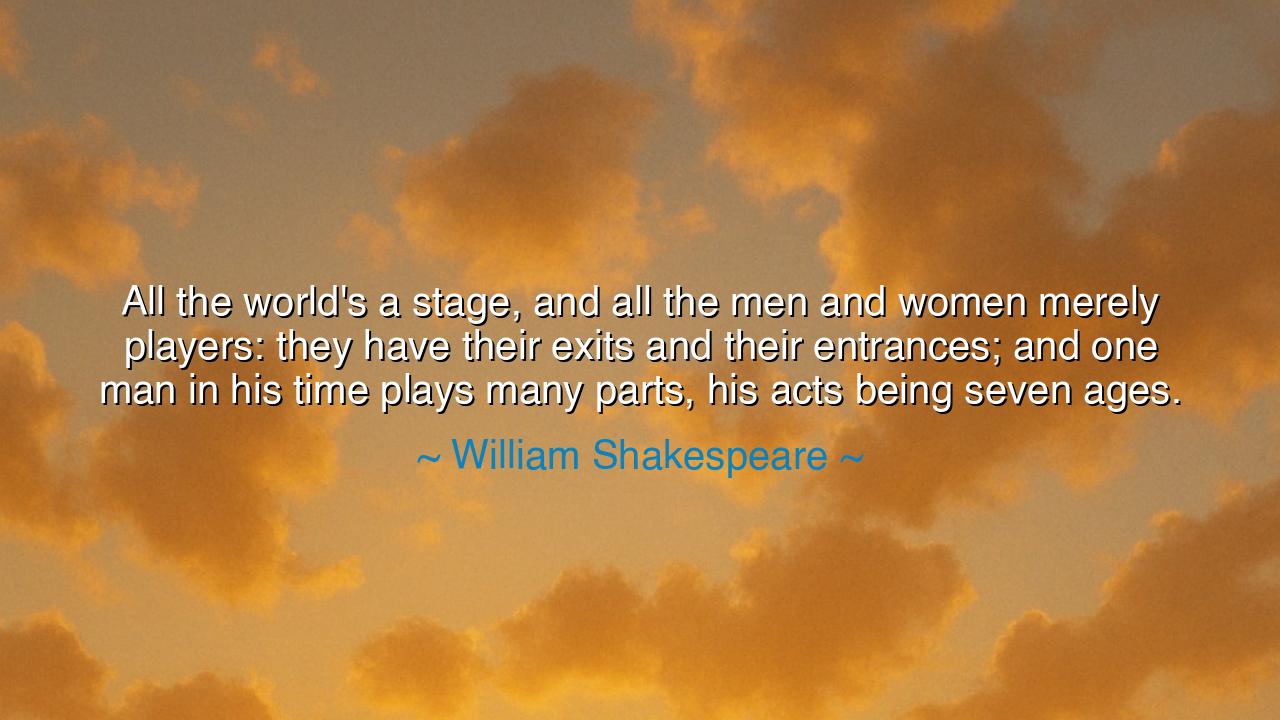
All the world's a stage, and all the men and women merely
All the world's a stage, and all the men and women merely players: they have their exits and their entrances; and one man in his time plays many parts, his acts being seven ages.






Hear, O seekers of wisdom, the immortal words of William Shakespeare, who declared: “All the world’s a stage, and all the men and women merely players: they have their exits and their entrances; and one man in his time plays many parts, his acts being seven ages.” This utterance, born from his play As You Like It, is not only poetry but prophecy, for it unveils the grand drama of life itself. Shakespeare, bard of the human soul, saw existence not as a chaos of random events, but as a performance, where each of us is both actor and audience, bound by the script of time.
The origin of this thought lies in the Elizabethan stage, where players performed in wooden theaters, before crowds that ranged from kings to peasants. Shakespeare lived among actors, costumed in borrowed robes, speaking words not their own, entering and leaving the scene as the play demanded. He saw in this art a mirror of life: just as the stage has roles, entrances, and exits, so too does life present us with roles we do not always choose, but must play nonetheless. In this recognition, he clothed the mystery of existence in the language of the theater.
The seven ages he names—infant, schoolboy, lover, soldier, justice, old age, and decrepitude—are not merely stages of growth, but archetypes of human destiny. Each age has its costume, its speech, its gesture, its dignity, and its folly. The infant cries without words, the lover sighs without reason, the soldier risks life for honor, the justice speaks with authority, and at last, the old man dwindles to silence. Thus, Shakespeare reminds us that life is a cycle, a play with beginnings and endings, laughter and sorrow, grandeur and frailty.
Consider the life of Alexander the Great, who played many parts upon the stage of history. As youth, he was the eager pupil of Aristotle; as young man, the conqueror of Persia; as king, the builder of cities; as dreamer, the seeker of unity among nations. Yet even he, the mightiest of his age, had his exit at thirty-two, leaving behind a divided empire. His story reflects Shakespeare’s teaching: no man holds a single role forever, but shifts through parts, and even the greatest must take his final bow.
Yet this vision is not meant to bring despair, but humility and purpose. For if life is a stage, then each of us, whether great or small, has a role of meaning. The beggar who comforts a child, the mother who raises her family, the teacher who sparks a mind—all are players whose scenes, though unseen by crowds, shape the play of the world. Shakespeare reminds us that dignity lies not in the length of one’s role, nor in its grandeur, but in the sincerity with which it is played.
And what of the exits and entrances? They remind us that no stage belongs to us alone. We inherit the scene from those before us, and we leave it to those who follow. Our duty, then, is not only to act our part well, but to leave the stage prepared for others—to pass on wisdom, justice, and love, so that the play may continue with harmony. This is the eternal rhythm: each generation an actor, each death a curtain fall, each birth a new beginning.
Therefore, O listener, take this teaching to heart: live your life as though it were a sacred performance. Do not waste your role in apathy or pride. Embrace each age, each transition, with courage. When young, learn with joy; when strong, act with honor; when wise, speak with compassion; when old, depart with grace. For though the play ends, the echoes of your performance linger in the hearts of those who watched, and your light remains woven into the fabric of the stage itself.
So remember the wisdom of Shakespeare: “All the world’s a stage.” Walk upon it with reverence, speak your lines with truth, and bow with dignity when the time of your exit comes. For the greatness of life is not in how long we act, but in how deeply we move those who share the stage with us.






AAdministratorAdministrator
Welcome, honored guests. Please leave a comment, we will respond soon